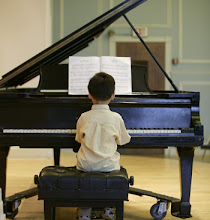Open positions in symphony orchestras are rare, and a spot in one of the best orchestras in the country is rarer still. At age 32, and after more than a decade honing his craft as a professional double bass player, Settlement alumnus and Boston Symphony Orchestra bassist Thomas Van Dyck stands at the pinnacle of his field.
 |
| Thomas with Boston Symphony Orchestra concertmaster Malcolm Lowe after winning his double bass audition |
exposed to classical music early on as well: his mother, Central Board of Trustees Chair Barrie Trimingham, frequently played classical recordings at home. He got his start playing classical music in Settlement’s Arco Chamber Orchestra, now known as the Trowbridge Chamber Orchestra, under the direction of Peter Dundon from 1996-98. He also worked as an intern for the Kaleidoscope Arts Enrichment Pre-K Program with Martha Glaze Zook and played a senior recital accompanied by piano faculty and Lillian Kraus Felber Distinguished Faculty Chair Jeffrey Uhlig. After studying at Rice University’s Shepherd School of Music and at Boston University, he embarked on a career in music, playing orchestral and chamber music with ensembles and at festivals across the United States.
Now that he’s settled in Boston, he’s no longer crisscrossing the country for auditions or substitute gigs, but he’s still focusing intensely on his own playing. Even at the height of the profession, there’s always more to learn.
Q: What experience prepared you most for this stage of your career?
Thomas Van Dyck: When you get to a certain level of mastery, then you have to focus on developing that last five or ten percent of your playing. For me, I got that through a combination of studying with Ed Barker at Boston University and being at Yellow Barn, a summer chamber music festival in Vermont. It’s where I found the joy and motivation of being around a community of players, and that really inspired me.
Q: What does it take to be a professional musician today?
TVD: The big thing is tenacity. You have to choose where to audition, how you will travel, and how you will get around—especially if you play something big, like a bass! It can be pretty brutal after a while, and you have to commit to that lifestyle. You also have to truly love the classical repertoire. A lot of the sustaining power in a career in music comes from loving a certain piece of music. When everyone’s on the same page and playing with a ton of commitment, there’s nothing like it. Life as a musician is not always going to be perfect, but more than ever, musicians will seek out situations where everyone plays together and respects each other.
Q: What lessons from your past do you share most frequently when teaching?
TVD: What I like to pass on is excitement and an intense energy in the process of discovery. It happens when you are really in the zone and you have an extreme, selfless excitement about figuring out what you’re playing. You have this feeling of infectious enthusiasm, and you get to the point where you are no longer thinking about yourself while you’re playing.
Q: What specific lessons or memories do you take with you from your time at Settlement?
TVD: When I first joined the Arco Chamber Orchestra at Settlement, I said, “Am I really ready for this?” I thought that everyone was already so good and I had this sense of insecurity, which motivated me to work really hard. I remember thinking while practicing, “this is my own thing.” That’s where I really developed a sense of ownership: from figuring out things on my instrument and discovering it for myself. It became a process of working to get better day to day, month to month, and year to year.
This post is adapted and expanded from Settlement Music School's fall 2013 newsletter. Read more online here.




No comments:
Post a Comment